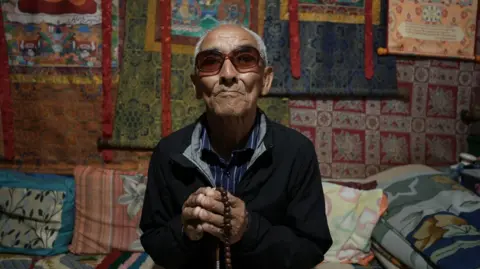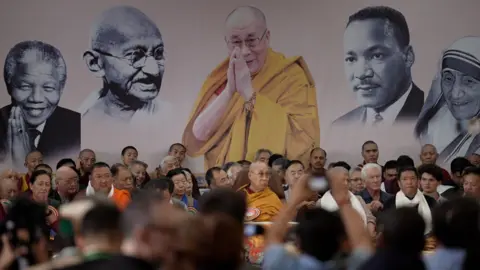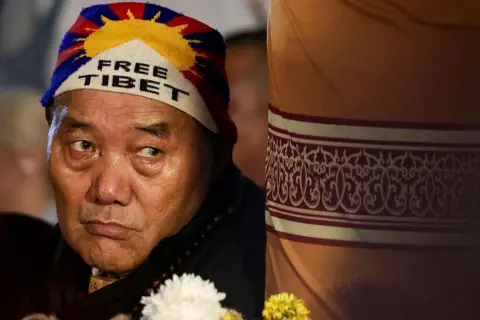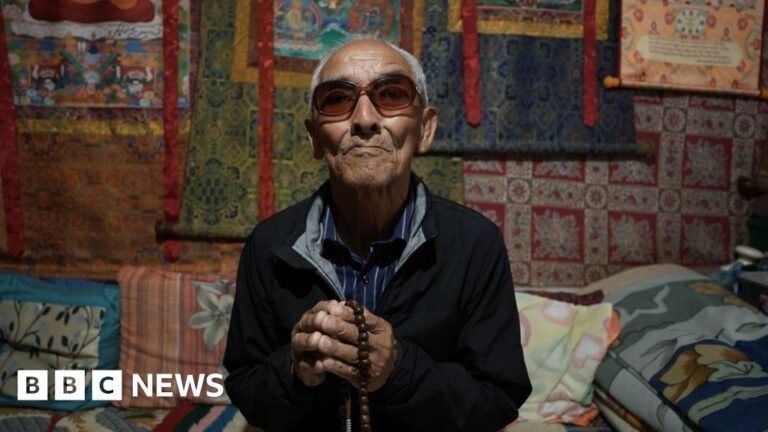BBC News, Dharamshala
 Sandeep Yadav/BBC
Sandeep Yadav/BBCWhat does it mean to live in exile?
“When we were in school, our teachers used to say that there is an ‘R’ on our forehead – meaning refugees,” says Tibetan writer-activist Tenzin Tsundue.
Mr Tsundue is one of around 70,000 Tibetans living in India, spread across 35 designated settlements.
In 1959, thousands of Tibetans fled after a failed uprising against Chinese rule.
Following their spiritual leader, the Dalai Lama, they crossed treacherous Himalayan passes and reached India, where they were accepted as refugees on humanitarian grounds and because of shared religious and cultural ties.
But living, or even being born, in India doesn’t make them Indians, says Mr Tsundue.
Tibetans in India live on renewable registration certificates issued every five years. Those born here can apply for passports if a parent was born in India between 1950 and 1987 – but must surrender the certificate to do so. Many hesitate, as it’s closely tied to their Tibetan identity.
In July, as the Dalai Lama turned 90, thousands of Tibetan Buddhists gathered in Dharamshala – a quiet town nestled in the foothills of the Himalayas in the north Indian state of Himachal Pradesh. The town serves as the headquarters of Central Tibetan Administration (CTA) – the Tibetan government-in-exile.
Even as they prayed for their leader’s long life, many like Mr Tsundue found themselves reflecting on the uncertainty of living in exile.
The emotional weight of displacement, the legal limbo of statelessness and geopolitics around the Dalai Lama hung heavy on the birthday celebrations.
 Sandeep Yadav/BBC
Sandeep Yadav/BBCTibetans continued migrating to India for decades after 1959, fleeing China’s tightening grip on their homeland.
Dawa Sangbo, 85, reached Dharamshala in 1970 after a gruelling seven-day trek through Nepal. “We ran at night and hid by day,” he recalls.
With no place to stay in India, he survived by living in a tent for 12 years and selling spices in villages near Dharamshala. He now lives with his son and wife in a neighbourhood largely inhabited by Tibetans.
For many like Mr Sangbo, fleeing to India may have provided security – but they still yearn for their homeland.
“A home is a home, after all,” says Pasang Gyalpo, who fled Tibet to Nepal before settling in India in 1990.
Five years later, Mr Gyalpo bribed Nepalese guards and slipped into Tibet to bring his family to India. But Chinese police chased him soon after arrival, forcing him to flee. His family remains in Tibet.
“They are in their homeland, I am in a foreign land. What else can I feel but pain?” he asks.
For younger Tibetans like Mr Tsunde, who are born in India, the pain is more existential.
“The trauma for us is not that we lost our land,” he says. “It’s that we were not born in Tibet and don’t have the right to live in Tibet. It is also this great sense of deprivation that something so very essential of our land, culture, and language has been taken away from us.”
Lobsang Yangtso, a researcher on Tibet and Himalayan regions, explains that being stateless means lacking a sense of belonging.
“It’s painful,” she says. “I have lived all my life here [in India] but I still feel homeless.”
 Getty Images
Getty ImagesTibetans in exile are grateful to India for refuge but lament their lack of rights – they cannot vote, own property or easily travel abroad without an Indian passport.
“We have the IC [an official travel document] which is given by the Indian government as an identity certificate,” says Phurbu Dolma. But airport immigration staff often don’t recognise it.
Dorjee Phuntsok, a Tibetan born in India, pointed out that many corporate jobs in India often require Indian passports. “Without one, we miss out on many opportunities.”
In recent years, thousands of Tibetans in India have emigrated to Western countries using the IC, which some nations accept for visa applications.
Many have left on student or work visas, resettled in countries like the US and Canada, or gone abroad on sponsorships from religious and humanitarian groups.
Penpa Tsering, the president of the CTA, believes that the reason is mainly economic. “Dollars and euros go further than what’s available here,” he says.
But for some like Thupten Wangchuk, 36, who crossed over to India as an eight-year-old, the motivation is more personal.
“For [almost] 30 long years, I haven’t met my parents and relatives. I’ve no one here,” he says. “The sole reason I want to go to a Western country is that I can become a citizen there. Then I can apply for a visa and go into Tibet to visit my parents.”
 Getty Images
Getty ImagesSome Tibetans acknowledge the need to be pragmatic given the geopolitical pulls and pressures.
“If you ask any Tibetan, they’ll say they want to go back,” says Kunchok Migmar, a CTA official. “But right now, there is no freedom in Tibet. No one wants to go back just to be beaten by the Chinese.”
The latest flashpoint emerged days before the Dalai Lama’s 90th birthday. He said his successor would be chosen by a trust under his office – a move China rejected, insisting it would decide under its law. Beijing called the succession issue a “thorn” in its ties with India.
India’s official stance is that it “does not take any position concerning beliefs and practices of faith and religion”. Notably, two senior ministers of the Indian government shared the stage with Dalai Lama on his birthday.
The Dalai Lama’s announcement that he would have a successor brought relief among Tibetans. But there is uncertainty over what his death could mean for the Tibetan movement.
“If we prepare ourselves well from now, when His Holiness is alive and [if] the future leaders who will follow us can continue the same momentum, then I think it should not affect us as much as people think it could,” says Mr Tsering.
His optimism is not shared by all Tibetans.
“It’s thanks to the current Dalai Lama that we have these opportunities and resources,” says Mr Phuntsok. He adds many Tibetans fear that after his passing, the community may lose the long-standing support that has sustained them.
Follow BBC News India on Instagram, YouTube, X and Facebook.


